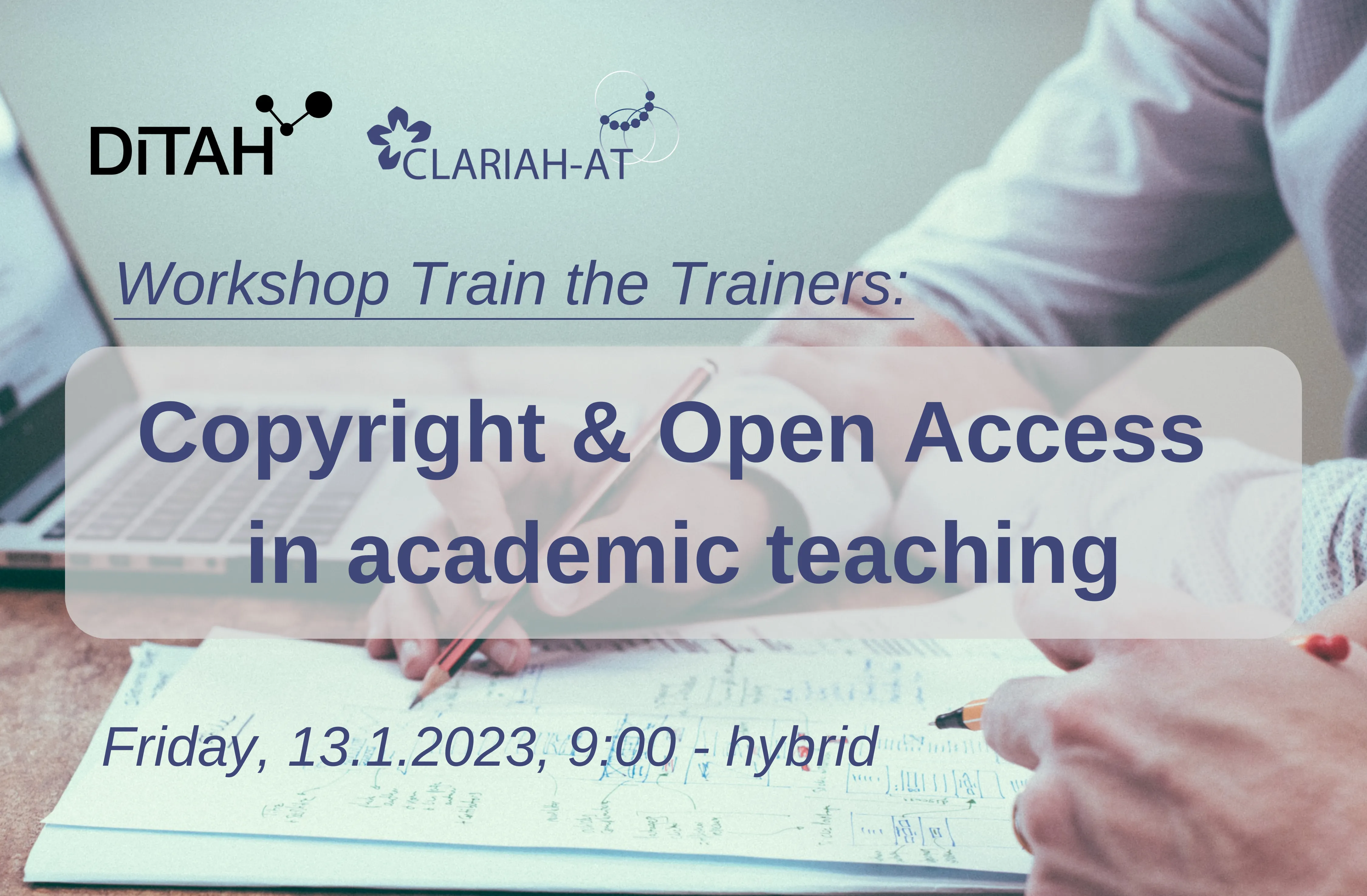
Train the Trainers: Copyright & Open Access in academic teaching
When: Friday, 13.1.2023, 9:00 -17:30
Where: Hybrid – Elisabethstraße 59/III, 8010 Graz – Zentrum für Informationsmodellierung SR 81.31
+ Stream (tba.)
Registration & Contact: elisabeth.raunig(at)uni-graz.at
As part of the DiTAH project (Digital Transformation of the Austrian Humanities) and within the framework of CLARIAH-AT, a focus is put on the provision of digital continuing education, teaching and learning materials. The availability of digital media regardless of time and place benefits working students, for example. However, it also offers the possibility of creating teaching opportunities that are not tied to fixed times and premises. Teaching content, tutorials and (self-)evaluation of what has been learned can thus be used much more effectively.
With the step of publishing these materials on the internet, however, the circle of addressees and the public that can be reached with them automatically becomes larger. At this point at the latest, images and texts must not only be referenced according to scientific criteria, but the various aspects of copyright must also be taken into account. This workshop will present what needs to be considered when creating (digital) learning and teaching materials.
Programme
9:00 – 10:30: Introduction to the basics of copyright law in the context of digital teaching (Walter Scholger)
The session deals with the basics of copyright law and answers questions from daily (teaching) practice at universities: Under what circumstances may teachers use copyrighted material and make it available to students? What are the obligations associated with publishing teaching content on websites? How can teachers license their course materials for subsequent use under OER license?
11:00 – 12:30: Image rights for lecturers (Charlotte Reuß)
Within the workshop, the theoretical basics of copyright law and the associated use of images in a university context will be discussed and worked through with the help of examples. In addition to outlining existing problems, the focus will be on solution-oriented approaches, and there will also be room for questions and discussion.
14:00 – 15:30: Open Access (Christian Kaier)
Open Access (OA) stands for free access to and unrestricted further use of scientific literature. Research results are therefore also available to the interested public, which further increases both their visibility and their benefit to society. While the OA share of the publication volume is increasing rapidly, the paths and questions associated with the transformation are also becoming more complex. The lecture summarises principles and variants of OA and addresses current challenges in the transition of scientific publishing under OA.
16:00 – 17:30: Open Educational Resources (Michael Kropp)
Open Educational Resources (OER) are freely available educational resources that can be used, edited and redistributed free of charge in a legally secure manner. To this end, the creators of these resources use special licensing models that regulate the further use of the materials. OER thus follow the basic principle: Anything that is not explicitly forbidden is permitted.
Presenters
Mag.phil. Christian Kaier (Universitätsbibliothek Graz) he works in the area of publication services and is a contact person on the topics of publication advice, open access and publication funding.
Mag. Dr. Michael Kopp (Universität Graz) is head of the Centre for Digital Teaching and Learning at the University of Graz. He is responsible for the development of methods, strategies and solutions in the field of media didactics and media production as well as with regard to the use of educational technologies. Kopp has been working with OER for over ten years and is significantly involved in numerous OER projects.
Charlotte Reuß, BA, M.A., is completing a dissertation on “Visual Arts’ Accessibility in the Digital Realm” at the University of Applied Arts in Vienna. She studied art history at the Ruprecht Karls University in Heidelberg and at the University of Vienna. She has worked on several projects at these universities, including IMAGE+. Her expertise includes copyright, art on the internet, media art and computer animation.
Mag.phil. Walter Scholger (Universitätsbibliothek Graz) studied History and Applied Cultural Studies (Cultural Management) in Graz and Maynooth. In addition to project management, he is dedicated to legal aspects of (digital) science, open science and the digital publication and re-use of research data from the fields of science and cultural heritage, and also pursues these topics in the context of international working groups (DARIAH-ELDAH, CLARIN-CLIC).